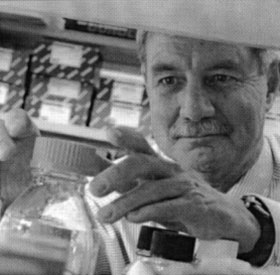William B. Kinlaw III, MD

Title(s)
Emeritus Professor of Medicine
Department(s)
Medicine
Education
Colgate University, BA 1973
Tufts University School of Medicine, MD 1977
Fellowship in Endocrinology and Metabolism, University of Minnesota 1981
Programs
Program in Experimental and Molecular Medicine
Contact Information
Dartmouth Medical School
HB 7700
Hanover NH 03755
Office: 606 Rubin
Professional Interests
Research Area:
Tumor Metabolism
Our research seeks to understand the peculiar metabolic needs of tumors, and how they adjust to them, with an eye toward exploiting tumor metabolism in the clinic. We have recently focused on the “addiction” of tumors, including breast cancers, to a supply of fatty acids. This has led to insights related to the regulation of lipid synthesis in tumors, and the ability to target it in preclinical systems and clinical trials. We recently found that tumors may not only synthesize fatty acids, but may also take them up from diet-derived lipoprotein particles in the circulation. Our laboratory has developed unique reagents to study these pathways, including novel antibodies and genetically engineered mice. We have also consistently focused on studies aimed to establish the relevance of our findings to actual human tumors, including breast and prostate cancers, sarcomas, and lymphomas, and are involved in clinical trials of the use of unusual fatty acids to manipulate these pathways inpatients.
Rotations and Thesis Projects
Rotations and Thesis Projects:
1. Determine the impact of the loss of cell-cell adhesion on metabolism of breast cancer cells.
2. Define the role of lipoprotein lipase to breast cancer metastasis in genetically engineered mice.
3. Determine the relevance of lipid uptake vs. synthesis pathways in a large (960 cases) array of human breast cancer tissue samples.
Grant Information
Role of protein S14 in normal and neoplastic mammary (NIH/NCI)
Endocrinology Training Grant (NIH)
Courses Taught
Endocrinology (Course Director)
Biography
Dr. Kinlaw received his MD from Tufts University in Boston in 1977 and trained under Dr. Jack Oppenheimer in Minneapolis until 1990, when he joined the faculty at Dartmouth.
Selected Publications |
|
Martel PM, Bingham CM, McGraw CJ, Baker CL, Morganelli PM, Meng ML, Armstrong JM, Moncur JT, Kinlaw WB. S14 protein in breast cancer cells: direct evidence of regulation by SREBP-1c, superinduction with progestin, and effects on cell growth. Exp Cell Res. 2006 Feb 1;312(3):278-88. Epub 2005 Nov 21. (view details in PubMed) Wells WA, Schwartz GN, Morganelli PM, Cole BF, Gibson JJ, Kinlaw WB. Expression of. Breast Cancer Res Treat. 2006 Jul;98(2):231-40. Epub 2006 Mar 22. (view details in PubMed) Hughes DT, Martel PM, Kinlaw WB, Eisenberg BL. The synthetic triterpenoid CDDO-Im inhibits fatty acid synthase expression and has antiproliferative and proapoptotic effects in human liposarcoma cells. Cancer Invest. 2008 Mar;26(2):118-27 (view details in PubMed) Donnelly C, Olsen AM, Lewis LD, Eisenberg BL, Eastman A, Kinlaw WB. Conjugated linoleic acid (CLA) inhibits expression of the Spot 14 (THRSP) and fatty acid synthase genes and impairs the growth of human breast cancer and liposarcoma cells. Nutr Cancer. 2009;61(1):114-22. (view details in PubMed) Olsen A, Eisenberg B, Kuemmerle N, Flanagan A, Morganelli P, Lombardo P, Swinnen J, Kinlaw W. Fatty acid synthesis is a target in human liposarcoma. Int. J. Oncology 2010; 36: 1309-1314. In press. Kuemmerle N, Kinlaw W. THRSP, thyroid hormone responsive (SPOT14 homolog, rat) Atlas of Genetics and Cytogenetics in Oncology and Haematology. http://atlasgeneticsoncology.org/Genes/THRSPID42555ch11q14.html Kuemmerle NB, Rysman E, Lombardo PS, Flanagan AJ, Lipe BC, Wells WA, Pettus JR, Froehlich HM, Memoli VA, Morganelli PM, Swinnen JV, Timmerman LA, Chaychi L, Fricano CJ, Eisenberg BL, Coleman WB, Kinlaw WB. Lipoprotein lipase links dietary fat to solid tumor cell proliferation. Mol Cancer Ther. 2011 Mar;10(3):427-36. Epub 2011 Jan 31. (view details in PubMed) |
|